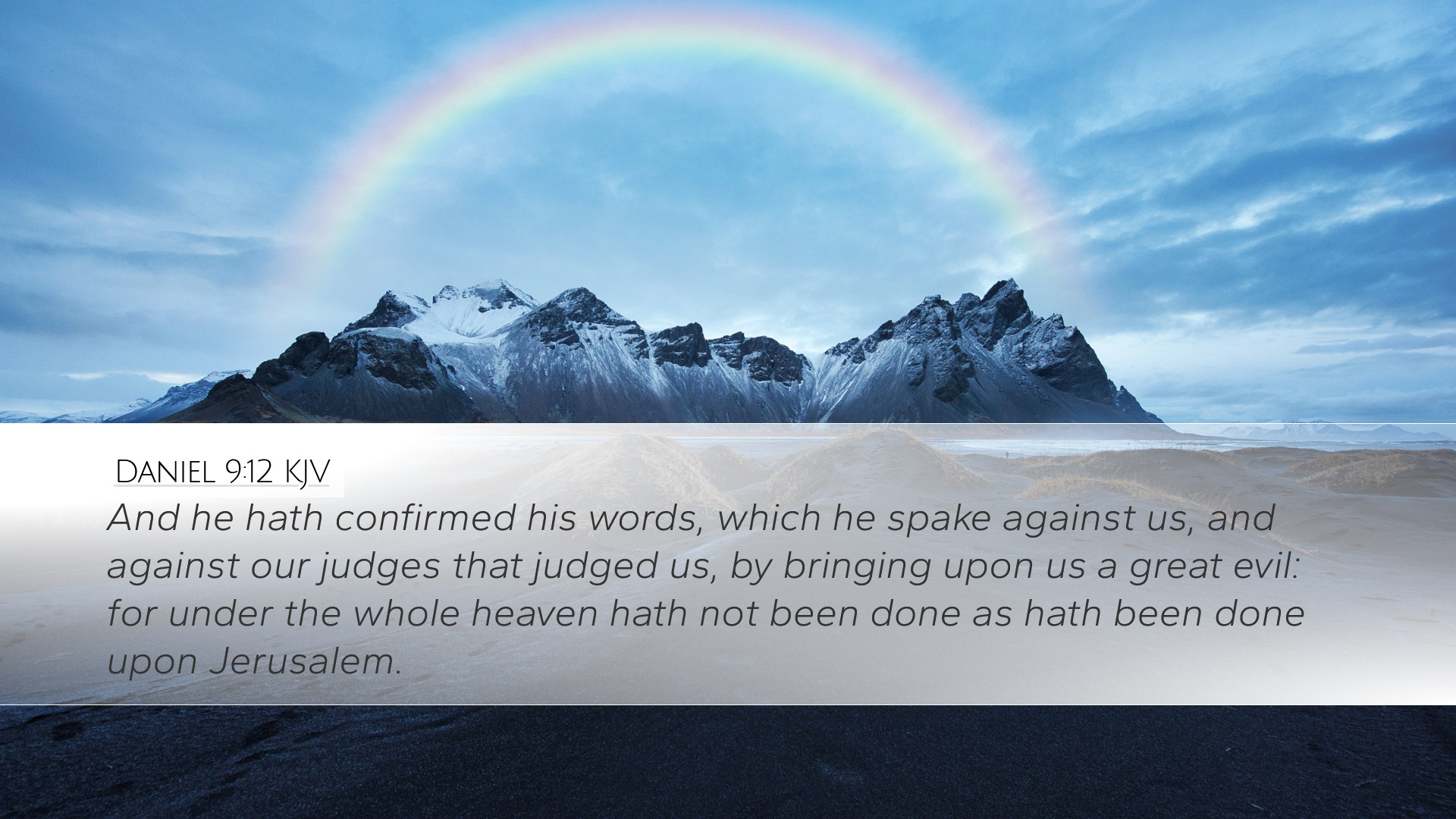Commentary on Daniel 9:12
Daniel 9:12 states, “And he hath confirmed his words, which he spake against us, and against our judges that judged us, by bringing upon us a great evil: for under the whole heaven hath not been done as hath been done upon Jerusalem.”
Introduction
This verse appears within Daniel's prayer of confession, where he seeks God's mercy for Israel. It encapsulates themes of divine judgment, the fulfillment of prophetic warnings, and the seriousness of Israel's sin. Various public domain commentaries provide invaluable insights into the theological and historical implications of this text.
Understanding Divine Judgment
Matthew Henry emphasizes the gravity of God’s judgment as a direct consequence of Israel’s disobedience. He notes that God confirmed His promises both of blessing and punishment, revealing a God who is faithful to His word, whether for blessing or cursing. This serves as a reality check for believers: the consequences of sin are severe and far-reaching.
Albert Barnes elaborates on the importance of understanding “great evil” as the culmination of prophetic warnings throughout Israel’s history. He reflects on how the calamities that befell Jerusalem were not merely the result of military conquests but represented the withdrawal of God’s favor, demonstrating how divine prophecy is fulfilled through historical events. He encourages readers to recognize the sovereignty of God even amid suffering.
Sin and Its Consequences
The acknowledgment of sin is crucial. Daniel’s prayer reveals a communal understanding of transgression. Adam Clarke underscores the significance of collective repentance, illustrating that the sins of leaders and the people lead to national consequences. Clarke notes that personal repentance is often insufficient without addressing the corporate sin that leads to judgment.
Specific Historical Context
Daniel’s prophecy is rooted in the historical context of the Babylonian captivity. Matthew Henry remarks that the desolation of Jerusalem was a direct fulfillment of the warnings given in the Mosaic covenant — both blessings for obedience and curses for disobedience. This historical backdrop reinforces the biblical principle of retribution.
- Fulfillment of prophecy is demonstrated by the catastrophic events described in Lamentations.
- Daniel’s perspective enables the church today to see that God’s judgments are often means of correction and calls to repentance.
Theological Insights
The verse also emphasizes God’s faithfulness, even in judgment. Albert Barnes expounds on the theological significance of God's commitment to His word. He asserts that God’s covenants are established and not forgotten, affirming the necessity of obedience: “He hath confirmed his words.” This underscores a core tenet of faith: God is just and will fulfill His promises, whether in grace or judgment.
The Role of Prayer and Repentance
Daniel's response is not merely one of despair but is characterized by earnest prayer and seeking God’s mercy. Adam Clarke notes that prayer is an acknowledgment of human frailty and a recognition of God’s sovereignty in bringing about redemption through repentance. This duality serves as a crucial lesson for believers: while judgment is deserved, mercy is always sought.
Conclusion
In conclusion, Daniel 9:12 serves as an admonition for the church today. The themes of sin, judgment, prayer, and divine sovereignty resonate profoundly in the contemporary believer's walk. Pastors and theologians are encouraged to teach on these principles, emphasizing that acknowledgement of sin, both individually and corporately, opens the door for genuine repentance and ultimately, God’s mercy.
As we reflect on this verse, may we be inspired to seek a deeper understanding of God’s Word, align our lives with His precepts, and approach Him in humility through sincere prayer.


